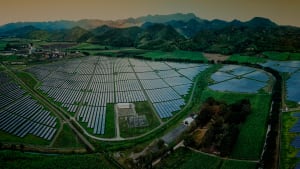What do you need to build the energy workforce of the future?
Organizations are facing a massive skills shortage. They have to retrain or hire people to operate a more digital, data-driven business that will help them make the transition to clean energy.
It’s estimated that in this decade alone, the energy transition will create 14 million new energy industry jobs. Another 16 million workers will be needed to support related areas, such as electric vehicles and energy efficiency improvements in buildings and appliances.
Often these are not just new vacancies, but entirely new occupations. And organizations from many industries are competing for the people with the skills needed to fill them.
The energy transition is also entwined with another global megatrend: digitalization. From smart grids to hydrogen-powered trucks, wherever the energy transition is happening — there is digitalization.
For many organizations adding digital skills is not easy. Our research, which collected data from close to 850 senior executives from nine industries and 22 countries, found that nearly half (46 percent) believe their organization struggles to retrain their workforce in using more digital/data-driven ways of working.
Simon Virley, Vice Chair and United Kingdom (U.K.) Head of Energy and Natural Resources at KPMG, highlights how important this is: “Technology has a massive part to play in the energy transition, so it's got to be part of the reskilling as well.” Virley continues, “We can't just do things manually in the same way we've done things in the past. Many businesses don’t have the skills in their organization or in their supply chains that are needed to make the energy transition happen.”
Even without the addition of new, clean energy skills, organizations are involved in a battle to retrain or hire the people they need to operate a more digital, data-driven organization. Taken together, there is a real concern that skill shortages could be a critical limitation on the speed and success of the energy transition.
Improving visibility and openness
There are two important, but often overlooked, competencies to have in place when addressing energy transition skill shortages:
1: Visibility
An essential first step to achieve your current and future energy transition goals is to map the skills you have today. Digital tools, such as online dashboards, provide visibility of data concerning people and skills which allow gaps to be flagged and acted upon quickly. Establishing a strong set of human resources (HR) learning and development platforms, as well as processes to capture skills, training, and experience data, is an essential first step.
The key is then to bring this data together from learning experience platforms, management systems and HR systems. This allows organizations to evaluate their current workforce skills, plan suitable interventions and forecast shortfalls. Armed with this knowledge, organizations can come up with a talent strategy that includes effectively recruiting new people and upskilling existing employees.
2: Openness
In our research, 68 percent of senior executives say their organization helps suppliers and partners to accelerate their adaptation to the energy transition. This kind of activity helps to spread skills and knowledge across the industry, but it is one of many that are driven by an organizational culture of openness.
These include everything from simple workshops to sophisticated knowledge-sharing platforms, mentorship programs and innovation challenges. At the heart of these is the idea that systems and processes need to be established to gather and share knowledge and skills.
Practical approaches to building the energy workforce of the future
Alongside these two competencies, there are several practical measures that organizations can implement or advocate for to increase the number of skilled workers developing resilient and technologically advanced energy systems. These include:
- Industry-specific training programs
- Increased female participation
- Increased vocational employment opportunities
- Reduced complexity in skills acquisitions and training processes
- Increased promotion of the benefits of energy careers enabling the energy transition to attract and retain a sustainability-conscious workforce
In the midst of a rapidly advancing energy transition, the demand for skilled workers is surging and organizations are grappling with a pressing need for specialized skills. Many organizations are struggling to adapt, retrain and upskill their workforce to harness the full potential of technology in this transformation. Without the right skills, the energy transition may falter. The dual challenge of upskilling for clean energy and embracing a digital, data-driven approach poses a critical concern for the pace and success of the transition.
To address this challenge, organizations need to build greater visibility into existing skills, nurture a pervasive culture of openness, and undertake as many practical measures as possible to cultivate a future-ready energy workforce. This holistic approach will be pivotal in shaping and realizing an equitable, sustainable, and ultimately successful energy transition.
-
Article
![]()
How do you govern an energy transition?
The speed, ease and ultimate success of the energy transition relies on robust leadership from policymakers and energy regulators, and stable, consistent governance.How do you govern an energy transition?The speed, ease and ultimate success of the energy transition relies on robust leadership from policymakers and energy regulators, and stable, consistent governance. -
Article
![]()
Decarbonizing energy: why a holistic and systems-based approach is needed
To switch to a world in which infrastructure of all kinds contributes to net zero targets, we must embrace complexity.
To incentivize the transition to a lower carbon world, targets are being set to reduce the net emissions associated with both the generation and utilization of energy. To attain these targets, we must embrace the complex world we inhabit, and build in flexibility to adapt to the circumstances of tomorrow.Decarbonizing energy: why a holistic and systems-based approach is neededA holistic appraisal is required of how energy is generated, transferred and utilized across all forms of infrastructure. Changing one part of this system has repercussions for other parts that have to be considered in the round.


